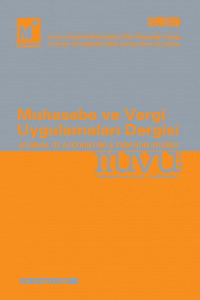FİNANSAL RAPORLAMADA STANDARDİZASYON VE MUHASEBE MESLEK MENSUPLARINI ZORLAYAN ÖĞRENME SÜRECİNİN BİLİNÇLİ YETKİNLİK ÖĞRENME MODELİ TEMELİNDE İRDELENMESİ
Finansal raporlamanın standardizasyonu, günümüz itibariyle genel kabul
gören, bu yönüyle gerekliliği ve yararları sıklıkla dile getirilen ancak bütünüyle
hayata geçirilemeyen bir olgudur. Bunun birçok nedeni vardır. Bunlardan
biri yayınlanan standartların öğrenilmesinde ve etkili bir uygulama
sürecinin sağlanmasında karşılaşılan güçlüktür. Tüm dünyada olduğu gibi
Türkiye’de de muhasebe meslek mensupları bu standartları öğrenmek ve
uygulamakla mükelleftirler. Fakat yapılan araştırmalara bakıldığında muhasebe
meslek mensuplarının bu standartları etkili bir biçimde öğrenemedikleri
ve/veya uygulayamadıkları göze çarpmaktadır. Bu çalışmanın amacı
da meslek mensuplarının; mevcut öğrenme süreçlerinde hangi aşamada
olduklarının ortaya çıkarılması ve UFRS’yi öğrenme ve uygulama bağlamında,
istenilen seviyeye hızlı ve etkili biçimde ulaşabilmeleri adına bilinçli
yetkinlik öğrenme modeli çerçevesinde edinilecek bulguların değerlendirilmesidir.
Bu amaçla, online anket yolu ile 121 meslek mensubuna
ulaşılmış ve toplanan veriler uygun yöntemler ile analize tabi tutulmuştur.
Meslek mensuplarının büyük çoğunluğunun standartlar hakkında bilinçli
fakat yetersiz oldukları ortaya çıkarken, bilincin ve yeterliliğin ancak öğrenim
düzeyindeki artış ile sağlanabileceği sonucuna ulaşılmıştır.
Anahtar Kelimeler:
ufrs, muhasebe meslek mensubu, öğrenme süreci, bilinçli yetkinlik öğrenme modeli
THE STANDARDIZATION OF FINANCIAL REPORTING AND AN EXAMINATION OF ITS LEARNING PROCESS THAT CHALLENGES ACCOUNTING PROFESSIONALS WITH REGARDS TO COMPETENCE LEARNING MODEL
Standardization of financial reporting is a generally accepted phenomenon,
and its requirements and benefits are often raised, but this phenomenon
could not be comprehensively implemented yet. One of these is
having some difficulties about learning the published standards and providing
effective implementation process. All over the world as well as in
Turkey the accounting professionals are obliged to learn and apply these
standards. But when the literature is examined, it has been shown that
the accounting professionals can not learn effectively and / or unable to
implement these standards. The aim of this study is to reveal that accounting
professionals in which stage of existing learning process and, to
evaluate the findings to be obtained in the framework of conscious competence
learning model in the context of learning and practice in IFRS to
reach the desired level quickly and effectively. For this purpose, 121 accounting
professionals have been reached with the online survey and the
data collected has been analyzed with using appropriate methods. It was
found that the majority of accounting professionals be aware of the standards,
but incompetence, and also it has been concluded that awareness
and competence can be achieved with the increase in education level.
___
- Doupnik, T. S. & Perera, H. (2007). International accounting. New York: McGraw Hill.
- Ehijeagbon, A. A. (2010). The adoption and implementation of International Financial Accounting Reporting Standards (IFRSs): Evaluation of the roles of key stakeholders in Nigeria, AAU JMS, Vol. 1, No.1, 147-158.
- Elitaş, C. (2010). Türkiye Muhasebe Standartları / Türkiye Finansal Raporlama Standartları üzerine yorumlar ve örnek uygulamalar. Ankara: Gazi Kitabevi.
- Fritz, S. & Lammle C. (2003). The International Harmonisation Process Accounting Standards. Yayınlanmamış Yüksek Lisans Tezi, Linköping Universitiet, İsveç.
- Gates, A. I. et al. (1962). Eğitim psikolojisi. Necmi R. Sarı (çev.). Ankara: Milli Eğitim Basımevi
- ISSN: 1308-3740
- Yayın Aralığı: Yılda 2 Sayı
- Başlangıç: 2008
- Yayıncı: Ankara Serbest Muhasebeci Mali Müşavirler Odası
